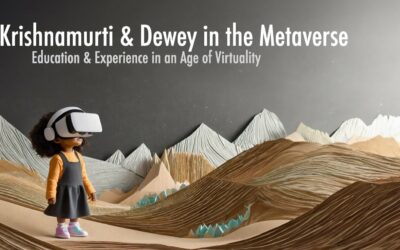It is difficult, in a world buffeted by change, to know what to hold on to. I often wonder about this when thinking of teaching and learning, when thinking of the speed at which technology is changing the world we live in… What do we hold on to? What do we let go? How do we know that we are not throwing the baby out with the bathwater? (Some earlier writing that allude to some of these issues can be found here, and here.)
I was thinking of these questions in the context of the series on creativity and trans-disciplinary learning I am writing for TechTrends (see the latest article, with links to previous pieces, here). And yesterday, while speaking with my partner-in-crime, Danah Henriksen, I was reminded of an insight I had many years ago… and one that I had somewhat forgotten. Which led to some searches on google, a few steps back memory-lane, and this blog post. Bear with me here…
Jonathan Miller is a renaissance man. His wikipedia page describes him as being a “British theatre and opera director, actor, author, television presenter, humorist, sculptor and medical doctor.” He is a trained physician and neuropsychologist, and somewhere in between managed to star in the classic British comedy Beyond the Fringe, direct opera, write books, direct TV shows and documentaries on science and art. In brief a polymath! More specifically I was reminded of a series he had done for the BBC titled, The Body in Question. I watched the series back in 1986 when I was doing a summer internship at the Rourkela Steel Plant (a lifetime ago in more ways than one). A search on Google revealed that the entire series was available on YouTube… and watching some of the episodes again brought back lots of memories.
In particular, I was reminded of the 10th episode, titled Balancing Act. In the first few minutes, Miller speaks to the idea of homeostasis, a balancing act all living organisms have to figure out if they are to survive in this always changing world. He does this by walking around in a mideavel garden pointing to how statues degrade over time and yet the fountains in the garden still maintain their “identity” despite continually changing. What is interesting is that each fountain has a distinct personality that stays unchanged. Describing this he says
A statue preserves it shape, so far as it can; while a fountain actually performs it.
And thus in a world beset by change and turbulence the only way to preserve one’s identity is not to be static and rigid but rather by continually “performing” it. The lesson in this for us educators working with technology is quite clear. Our survival depends on this balancing act – holding on tightly to some core values (our core identity as it were) while letting go lightly of some of the more superficial aspects. This, of course, is easier said than done…
I was also reminded, while writing this essay, of something written by Peter Brooks, the theatre director (and contemporary of Miller). In his book The Shifting Point, Brooks says:
I have never believed in one single truth, whether it is mine or somebody else’s. I think that all schools and all theories can be useful in particular places and at given times. But I think that the only way to live is to passionately, and absolutely, commit ourselves to one point of view.
In any case, as time goes by, and as we change, objectives vary and the point of view moves around. When I think of essays I have written and the ideas which have come to life in numerous places, something strikes me : there is a certain continuity. For a point of view to have any useful purpose, you have to be completely committed to it and defend it to the death. And this even when a little voice is murmurng inside you at the same time “hold on tightly, let go lightly”.
So if there is a mantra for our age, it may be this: Hold on tightly, let go lightly!


0 Comments